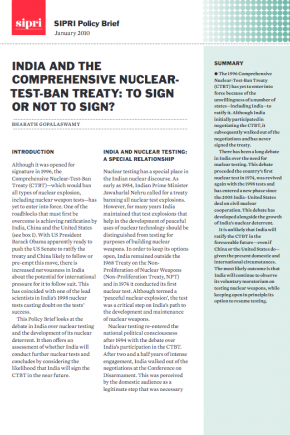India and the Comprehensive Nuclear-Test-Ban Treaty: To Sign or not to Sign?
The 1996 Comprehensive Nuclear-Test-Ban Treaty (CTBT) has yet to enter into force because of the unwillingness of a number of states—including India—to ratify it. Although India initially participated in negotiating the CTBT, it subsequently walked out of the negotiations and has never signed the treaty.
There has been a long debate in India over the need for nuclear testing. This debate preceded the country’s first nuclear test in 1974, was revived again with the 1998 tests and has entered a new phase since the 2005 India–United States deal on civil nuclear cooperation. This debate has developed alongside the growth of India’s nuclear deterrent.
It is unlikely that India will ratify the CTBT in the foreseeable future—even if China or the United States do—given the present domestic and international circumstances. The most likely outcome is that India will continue to observe its voluntary moratorium on testing nuclear weapons, while keeping open in principle its option to resume testing.

